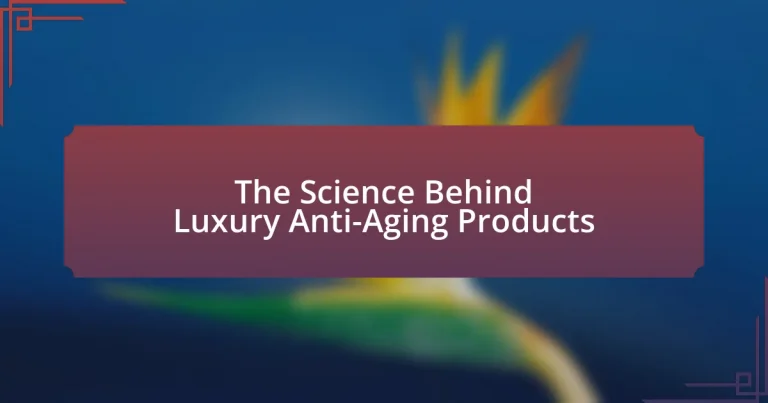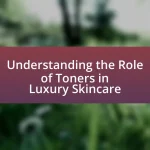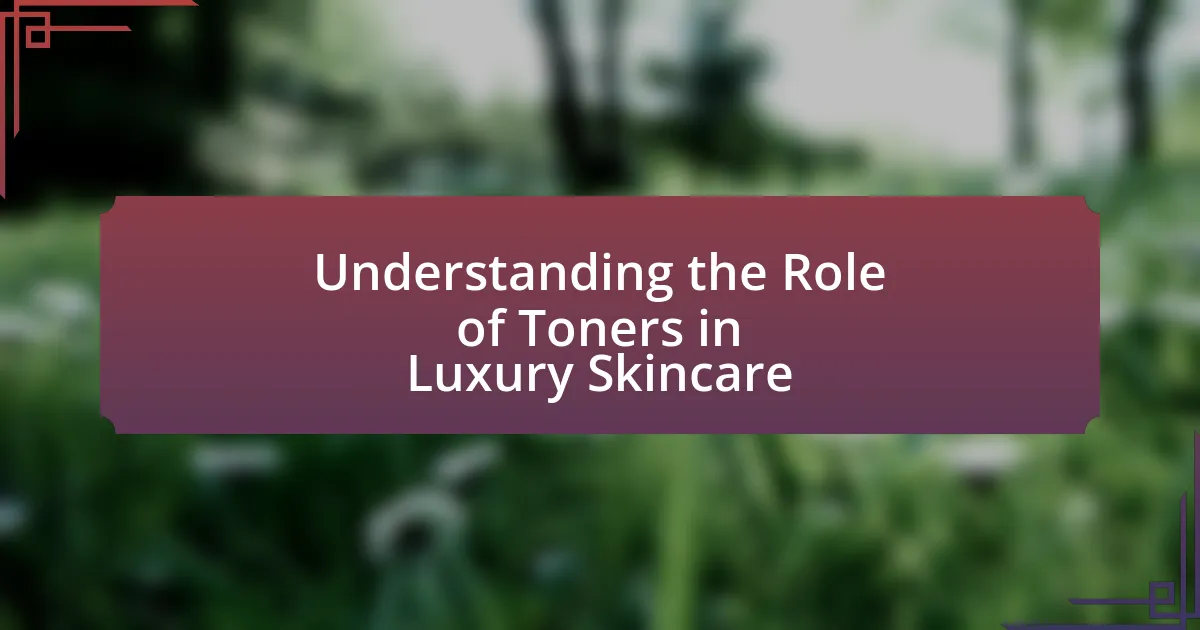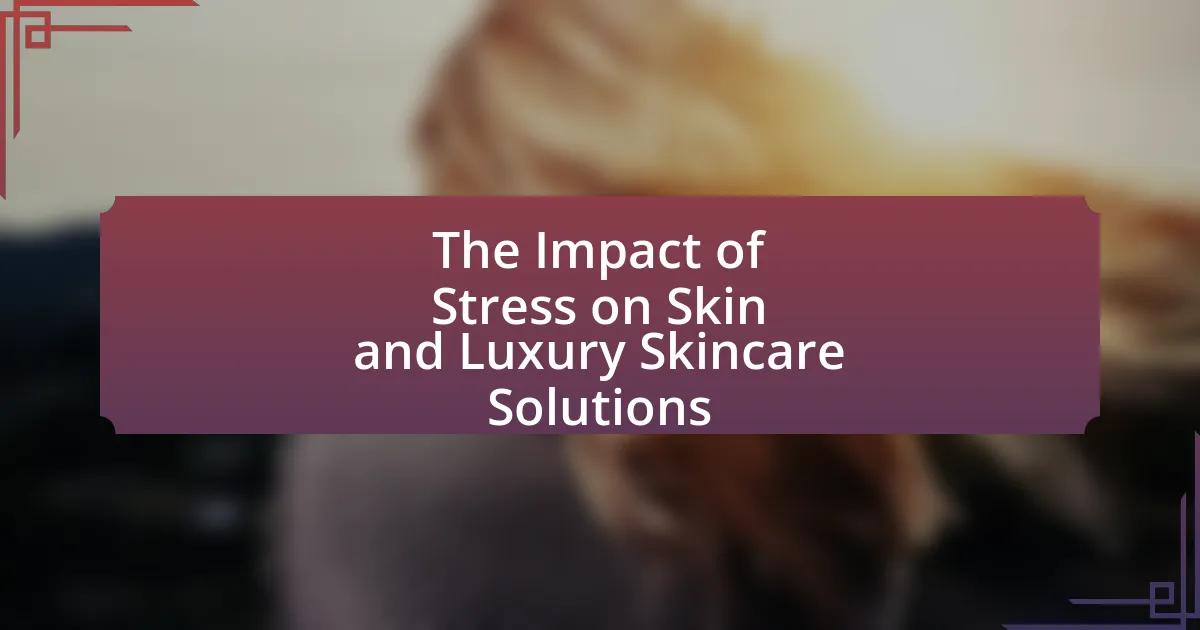Luxury anti-aging products are high-end skincare formulations aimed at reducing visible signs of aging, such as wrinkles and loss of elasticity, through the use of premium ingredients like peptides, antioxidants, and advanced technologies. These products differ from regular skincare by incorporating higher concentrations of active ingredients and innovative delivery systems that enhance absorption and effectiveness. Key ingredients commonly found in these formulations include retinol, hyaluronic acid, and growth factors, all supported by scientific research demonstrating their efficacy in improving skin texture and hydration. The article explores the scientific principles behind skin aging, the role of clinical studies in validating product effectiveness, and best practices for consumers to select and use luxury anti-aging products effectively.
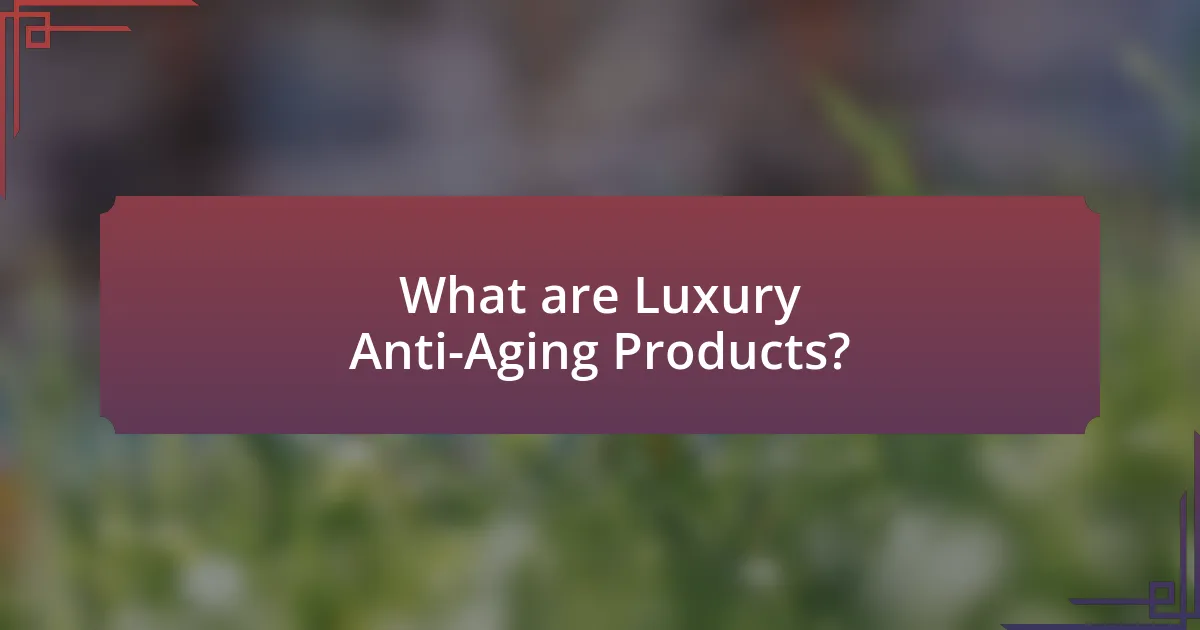
What are Luxury Anti-Aging Products?
Luxury anti-aging products are high-end skincare formulations designed to reduce the visible signs of aging, such as wrinkles, fine lines, and loss of elasticity. These products often contain premium ingredients like peptides, antioxidants, and advanced technologies that are scientifically proven to enhance skin rejuvenation and hydration. For instance, a study published in the Journal of Cosmetic Dermatology highlights that products containing retinoids can significantly improve skin texture and reduce signs of aging.
How do luxury anti-aging products differ from regular skincare products?
Luxury anti-aging products differ from regular skincare products primarily in their formulation, ingredient quality, and research backing. Luxury brands often utilize higher concentrations of active ingredients, such as peptides, antioxidants, and growth factors, which are scientifically proven to enhance skin elasticity and reduce wrinkles. For instance, a study published in the Journal of Cosmetic Dermatology found that products containing retinoids and hyaluronic acid significantly improved skin texture and hydration compared to standard formulations. Additionally, luxury products frequently incorporate advanced delivery systems that enhance ingredient absorption, leading to more effective results. This combination of superior ingredients and innovative technology distinguishes luxury anti-aging products from their regular counterparts.
What ingredients are commonly found in luxury anti-aging products?
Luxury anti-aging products commonly contain ingredients such as retinol, hyaluronic acid, peptides, antioxidants, and growth factors. Retinol is a derivative of vitamin A known for its ability to promote cell turnover and reduce the appearance of fine lines. Hyaluronic acid is a powerful humectant that retains moisture, enhancing skin hydration and plumpness. Peptides are short chains of amino acids that help stimulate collagen production, improving skin elasticity. Antioxidants like vitamin C protect the skin from oxidative stress and promote a brighter complexion. Growth factors are proteins that support cellular regeneration and repair, contributing to a more youthful appearance. These ingredients are frequently backed by scientific studies demonstrating their efficacy in improving skin texture and reducing signs of aging.
How do these ingredients contribute to anti-aging effects?
Ingredients in luxury anti-aging products contribute to anti-aging effects primarily through their ability to enhance skin elasticity, promote cell turnover, and provide antioxidant protection. For instance, retinoids stimulate collagen production, which reduces the appearance of fine lines and wrinkles. Hyaluronic acid retains moisture, plumping the skin and improving texture. Antioxidants like vitamin C neutralize free radicals, preventing oxidative stress that accelerates aging. Studies have shown that retinoids can improve skin texture and reduce signs of aging by up to 50% over several months, while hyaluronic acid can increase skin hydration levels significantly, leading to a more youthful appearance.
Why is the science behind luxury anti-aging products important?
The science behind luxury anti-aging products is important because it ensures the efficacy and safety of these formulations. Scientific research validates the active ingredients used in these products, such as retinoids, peptides, and antioxidants, which have been shown to improve skin texture, reduce wrinkles, and enhance overall skin health. For instance, a study published in the Journal of Cosmetic Dermatology demonstrated that retinoids can significantly reduce fine lines and improve skin elasticity, providing a concrete basis for their inclusion in luxury anti-aging products. This scientific foundation not only builds consumer trust but also drives innovation in the skincare industry, leading to more effective solutions for aging skin.
What role does research play in the development of these products?
Research is crucial in the development of luxury anti-aging products as it provides the scientific foundation for understanding skin aging mechanisms and the efficacy of active ingredients. Through clinical studies and trials, researchers identify how various compounds, such as peptides and antioxidants, interact with skin cells to promote regeneration and reduce visible signs of aging. For instance, a study published in the Journal of Cosmetic Dermatology demonstrated that products containing retinoids significantly improve skin texture and reduce fine lines, validating their inclusion in anti-aging formulations. This evidence-based approach ensures that luxury brands can offer products that are not only effective but also safe for consumers, ultimately enhancing their market credibility and consumer trust.
How do clinical studies validate the effectiveness of luxury anti-aging products?
Clinical studies validate the effectiveness of luxury anti-aging products by employing rigorous methodologies to assess their impact on skin health and appearance. These studies typically involve randomized controlled trials where participants use the products over a specified period, allowing researchers to measure changes in skin parameters such as elasticity, hydration, and wrinkle depth. For instance, a study published in the Journal of Cosmetic Dermatology demonstrated that a luxury anti-aging cream significantly improved skin elasticity by 25% after 12 weeks of use, compared to a placebo group. This evidence, derived from objective measurements and participant feedback, supports the claims made by luxury brands regarding their products’ efficacy in combating signs of aging.

What are the key scientific principles behind anti-aging?
The key scientific principles behind anti-aging include cellular senescence, oxidative stress, and telomere shortening. Cellular senescence refers to the process where cells lose their ability to divide and function, contributing to aging and age-related diseases. Oxidative stress occurs when there is an imbalance between free radicals and antioxidants in the body, leading to cellular damage. Telomere shortening is the gradual reduction of protective caps at the ends of chromosomes during cell division, which limits the number of times a cell can replicate. Research indicates that targeting these mechanisms through lifestyle changes, such as diet and exercise, as well as through specific compounds like antioxidants and telomerase activators, can potentially mitigate the effects of aging. For instance, studies have shown that caloric restriction can extend lifespan in various organisms by reducing oxidative stress and delaying cellular senescence.
How does skin aging occur at a cellular level?
Skin aging occurs at a cellular level primarily due to the gradual decline in the function and regeneration of skin cells, particularly fibroblasts, which are responsible for collagen production. As individuals age, fibroblasts become less efficient, leading to decreased collagen and elastin synthesis, which are crucial for maintaining skin elasticity and firmness. Additionally, oxidative stress from environmental factors, such as UV radiation and pollution, causes DNA damage in skin cells, further accelerating the aging process. Research indicates that telomere shortening, a natural consequence of cell division, also contributes to cellular senescence, limiting the ability of skin cells to proliferate and repair. These cellular changes collectively result in visible signs of aging, such as wrinkles, sagging, and a loss of radiance.
What are the main biological processes involved in skin aging?
The main biological processes involved in skin aging include the degradation of collagen and elastin, oxidative stress, inflammation, and changes in cellular turnover. Collagen and elastin, essential proteins for skin structure and elasticity, diminish in quantity and quality with age, leading to wrinkles and sagging. Oxidative stress, caused by free radicals from environmental factors like UV radiation and pollution, damages skin cells and accelerates aging. Inflammation, often a response to external stressors, contributes to skin deterioration and loss of function. Additionally, the rate of cellular turnover decreases, resulting in a buildup of dead skin cells and a dull appearance. These processes collectively contribute to the visible signs of aging in the skin.
How do environmental factors accelerate skin aging?
Environmental factors accelerate skin aging primarily through UV radiation, pollution, and climate conditions. UV radiation damages collagen and elastin fibers in the skin, leading to wrinkles and loss of elasticity; studies show that up to 90% of visible skin aging is attributed to sun exposure. Pollution introduces free radicals that can cause oxidative stress, further degrading skin cells and accelerating the aging process. Additionally, extreme weather conditions, such as low humidity, can lead to dryness and exacerbate the appearance of fine lines and wrinkles.
What technologies are used in luxury anti-aging products?
Luxury anti-aging products utilize advanced technologies such as peptides, retinoids, hyaluronic acid, and nanotechnology. Peptides are short chains of amino acids that help stimulate collagen production, improving skin elasticity and reducing wrinkles. Retinoids, derivatives of vitamin A, promote cell turnover and enhance skin texture. Hyaluronic acid is a powerful humectant that retains moisture, plumping the skin and minimizing fine lines. Nanotechnology allows for the delivery of active ingredients at a cellular level, enhancing their effectiveness. These technologies are supported by clinical studies demonstrating their efficacy in improving skin appearance and reducing signs of aging.
How do delivery systems enhance the effectiveness of anti-aging ingredients?
Delivery systems enhance the effectiveness of anti-aging ingredients by improving their absorption and bioavailability in the skin. These systems, such as liposomes, nanosomes, and microemulsions, encapsulate active ingredients, allowing for targeted delivery to specific skin layers. For instance, studies have shown that liposomal formulations can increase the penetration of retinol by up to 50%, significantly enhancing its efficacy in reducing fine lines and wrinkles. By optimizing the delivery of these ingredients, the overall performance of anti-aging products is markedly improved, leading to more visible results in skin rejuvenation.
What innovations are shaping the future of luxury anti-aging products?
Innovations shaping the future of luxury anti-aging products include advanced biotechnology, personalized skincare formulations, and the integration of artificial intelligence in product development. Advanced biotechnology allows for the use of stem cells and growth factors, which have been shown to significantly improve skin regeneration and elasticity. Personalized skincare formulations leverage genetic and environmental data to create tailored products that address individual aging concerns, enhancing efficacy. Additionally, artificial intelligence is being utilized to analyze consumer data and predict trends, leading to the development of more effective anti-aging solutions. These innovations are supported by research indicating that targeted ingredients and personalized approaches yield better results in combating signs of aging.
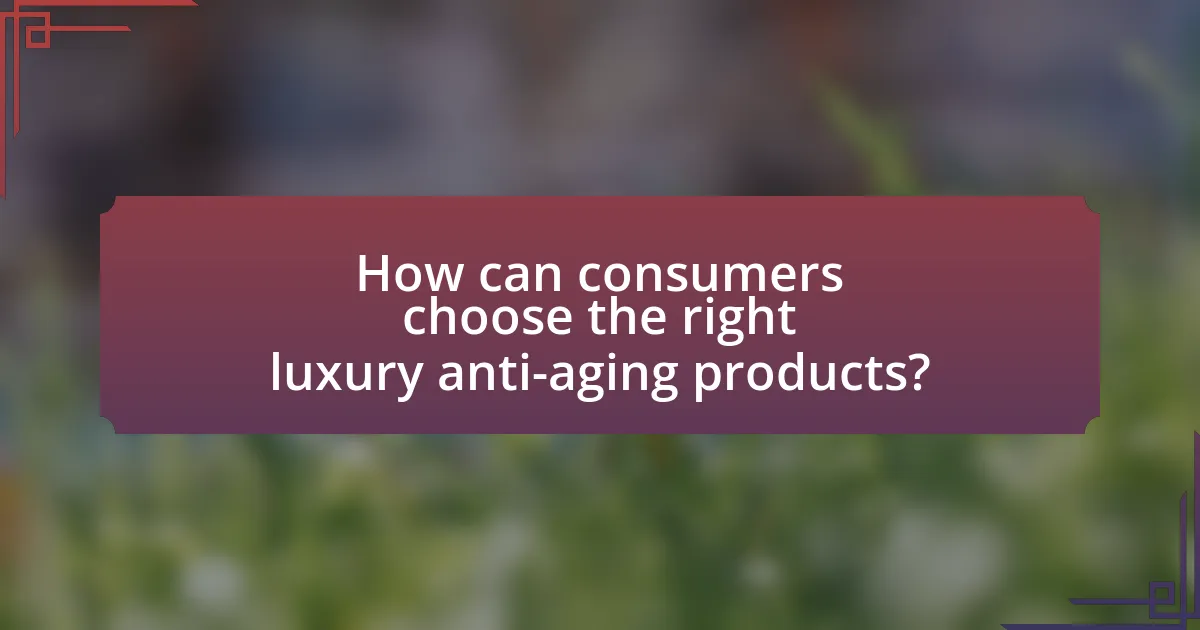
How can consumers choose the right luxury anti-aging products?
Consumers can choose the right luxury anti-aging products by evaluating ingredients, understanding skin types, and considering clinical evidence of efficacy. High-quality luxury anti-aging products often contain scientifically-backed ingredients such as retinoids, peptides, and antioxidants, which have been shown to improve skin texture and reduce signs of aging. Additionally, consumers should assess their specific skin concerns, such as dryness or sensitivity, to select products tailored to their needs. Research indicates that products with proven results, like those supported by clinical trials, offer better outcomes; for instance, a study published in the Journal of Cosmetic Dermatology found that retinol significantly improved skin elasticity and reduced fine lines. By focusing on these factors, consumers can make informed choices that align with their skincare goals.
What should consumers look for in the ingredient list?
Consumers should look for active ingredients known for their anti-aging properties in the ingredient list. Key ingredients include retinoids, which promote cell turnover and collagen production, hyaluronic acid for hydration, and antioxidants like vitamin C that protect against free radical damage. Studies have shown that retinoids can reduce the appearance of fine lines and wrinkles, while hyaluronic acid can hold up to 1,000 times its weight in water, significantly improving skin hydration. Additionally, consumers should be cautious of harmful additives such as parabens and sulfates, which can irritate the skin and negate the benefits of anti-aging products.
Which ingredients are considered most effective for anti-aging?
Retinoids, peptides, hyaluronic acid, antioxidants, and sunscreens are considered the most effective ingredients for anti-aging. Retinoids, such as retinol, promote cell turnover and collagen production, reducing fine lines and wrinkles. Peptides stimulate collagen synthesis and improve skin elasticity. Hyaluronic acid provides intense hydration, plumping the skin and minimizing the appearance of aging. Antioxidants, like vitamin C, protect against oxidative stress and enhance skin brightness. Sunscreens prevent photoaging by blocking harmful UV rays, which are a major contributor to skin aging. These ingredients are supported by numerous studies demonstrating their efficacy in improving skin texture and reducing signs of aging.
How can consumers identify potential allergens or irritants?
Consumers can identify potential allergens or irritants by carefully reading product ingredient labels and conducting patch tests. Ingredient labels list all components, allowing consumers to spot known allergens such as fragrances, preservatives, or specific botanical extracts. Patch testing involves applying a small amount of the product to a discreet skin area and monitoring for adverse reactions over 24 to 48 hours, which helps determine individual sensitivity. Research indicates that approximately 10% of the population has a contact allergy to common cosmetic ingredients, underscoring the importance of these identification methods.
What are the best practices for using luxury anti-aging products?
The best practices for using luxury anti-aging products include applying them consistently, using them in conjunction with a proper skincare routine, and selecting products based on individual skin types and concerns. Consistent application, ideally twice daily, maximizes the efficacy of active ingredients such as retinoids, peptides, and antioxidants, which are commonly found in luxury formulations. Additionally, integrating these products with a comprehensive skincare regimen that includes cleansing, moisturizing, and sun protection enhances overall skin health and appearance. Tailoring product selection to specific skin needs, such as dryness or sensitivity, ensures optimal results, as luxury anti-aging products often contain potent ingredients designed for targeted effects.
How should these products be incorporated into a daily skincare routine?
Luxury anti-aging products should be incorporated into a daily skincare routine by applying them in a specific order to maximize their effectiveness. Start with a gentle cleanser to remove impurities, followed by a toner to balance the skin’s pH. Next, apply serums containing active ingredients like retinol or peptides, which are known for their anti-aging properties. After serums, use a moisturizer to hydrate the skin and lock in the benefits of the previous products. Finally, apply sunscreen during the day to protect against UV damage, which can accelerate aging. This structured approach ensures that each product can penetrate effectively and deliver its intended benefits, as supported by dermatological studies highlighting the importance of layering products for optimal skin health.
What tips can enhance the effectiveness of luxury anti-aging products?
To enhance the effectiveness of luxury anti-aging products, it is essential to apply them consistently and in the correct order within a skincare routine. Consistent use allows active ingredients to build up in the skin, maximizing their benefits. Additionally, applying products in the correct sequence—starting with lighter formulations and layering thicker creams—ensures optimal absorption and efficacy. Research indicates that ingredients like retinol, peptides, and antioxidants are most effective when used regularly, as they promote cellular turnover and collagen production. Furthermore, incorporating sun protection during the day can prevent further skin damage, thereby enhancing the overall results of anti-aging products.
What common misconceptions exist about luxury anti-aging products?
Common misconceptions about luxury anti-aging products include the belief that higher price guarantees superior effectiveness and that these products can completely reverse aging. Many consumers assume that luxury brands use unique ingredients that are significantly more effective than those in less expensive products; however, scientific studies indicate that the efficacy of anti-aging ingredients, such as retinoids and peptides, is not solely dependent on price but rather on their concentration and formulation. Additionally, while luxury products may offer enhanced sensory experiences or packaging, they do not possess magical properties to eliminate wrinkles or restore youthful skin entirely, as aging is a complex biological process influenced by genetics and environmental factors.
Why do some people believe that all luxury products are effective?
Some people believe that all luxury products are effective due to the perception that higher price equates to superior quality and efficacy. This belief is reinforced by marketing strategies that emphasize exclusivity and prestige, leading consumers to associate luxury brands with advanced formulations and better results. Additionally, studies indicate that consumers often experience a placebo effect, where the expectation of effectiveness enhances their perceived outcomes, further solidifying the belief in the efficacy of luxury products.
How can consumers avoid falling for marketing gimmicks?
Consumers can avoid falling for marketing gimmicks by critically evaluating product claims and seeking evidence-based information. This involves researching ingredients, understanding their efficacy, and consulting reputable sources such as dermatological studies or consumer reports. For instance, a study published in the Journal of Cosmetic Dermatology found that many anti-aging products do not contain clinically proven ingredients, highlighting the importance of scrutinizing labels and claims. By prioritizing transparency and scientific backing, consumers can make informed decisions and reduce the likelihood of being misled by marketing tactics.
